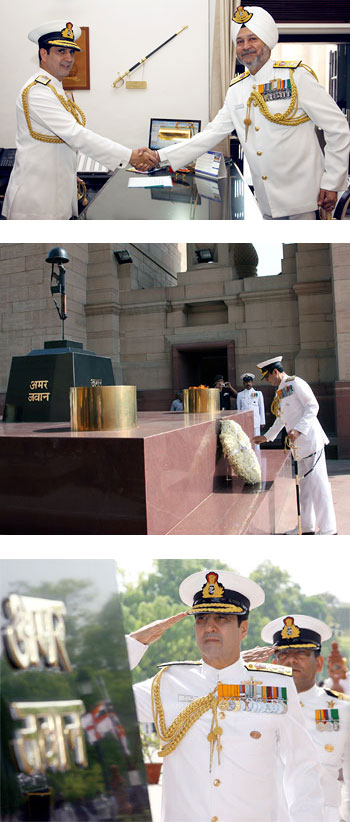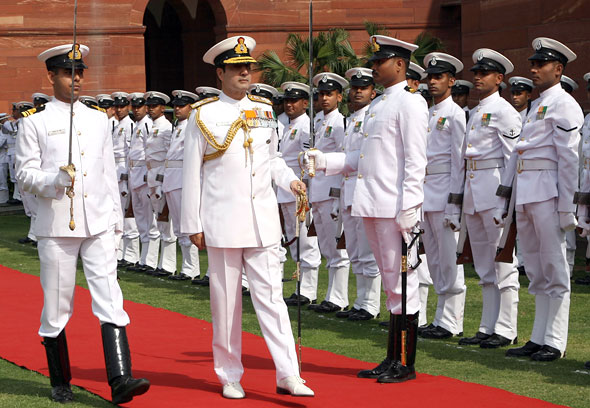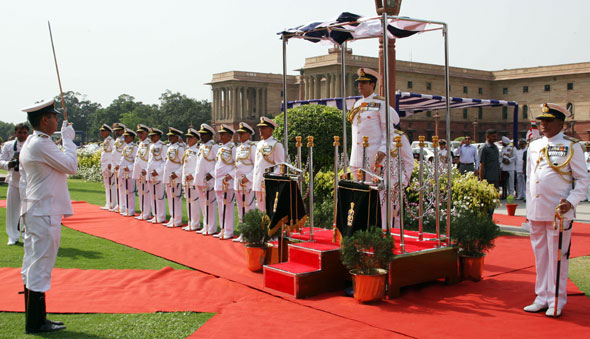INDIAN ARMED FORCES CHIEFS ON
OUR RELENTLESS AND FOCUSED PUBLISHING EFFORTS

SP Guide Publications puts forth a well compiled articulation of issues, pursuits and accomplishments of the Indian Army, over the years

I am confident that SP Guide Publications would continue to inform, inspire and influence.

My compliments to SP Guide Publications for informative and credible reportage on contemporary aerospace issues over the past six decades.
- Prime Minister witnesses 'Bharat Shakti' – a Tri-Services Firing and Manoeuvre Exercise in Pokhran, Rajasthan
- Interim Defence Budget 2024-25 — An Analysis
- Union Defence budget 2024
- Prime Minister Modi Commemorates Indian Navy Day in a Grand Ceremony
- Prime Minister Modi Flies in the LCA Tejas
- New Chapter in India-Italy Defence Ties
- Airpower beyond Boundaries
Admiral R.K. Dhowan is the 22nd Indian Navy Chief

Admiral Rabinder Kumar Dhowan, Vice Chief of Naval Staff and the officiating CNS until April 16, 2014, was approved by the Government of India to be the 22nd Chief of the Naval Staff. He has become the 20th Indian to be at the helm of the Indian Navy.
He is an alumnus of the National Defence Academy, Khadakwasla and the Defence Services Staff College, Wellington. In his long and distinguished service spanning over 39 years, he has served in a variety of Command, Staff and Instructional appointments.
His Sea Commands include guided missile corvette INS Khukri, Kashin class guided missile destroyer INS Ranjit and indigenous guided missile destroyer INS Delhi.
He is a graduate of Naval War College, Rhode Island, USA. He was the Naval Adviser at the High Commission of India, London. His important staff appointments at Naval Headquarters include, Deputy Director, Naval Operations, Joint Director, Naval Plans and Assistant Chief of Naval Staff (Policy and Plans).
He has commanded the Eastern Fleet, one of the operational fleets of the Indian Navy. He has also served as the Senior Instructor at the Defence Services Staff College, Wellington.
His other important appointments include, Chief Staff Officer (Operations), Headquarters Western Naval Command, Chief of Staff at Headquarters Eastern Naval Command the Commandant National Defence Academy, Khadakwasla and the Vice Chief of Naval Staff.
He is recipient of PVSM, AVSM, YSM and ADC.
Appointment of Admiral Robin Dhowan comes at a very crucial juncture when the Indian Navy was rendered headless for over 50 days, owing to the untimely resignation by his predecessor, Admiral D.K. Joshi on the sterling grounds of taking moral responsibility for a series of mishaps on board ships and submarines of the Indian Navy.
To compound to the extraordinary situation was the indecent and indiscreet hurry shown by the Government of India in accepting the resignation by Admiral D.K. Joshi, in a matter of few hours without any care or concern for the Indian Navy which had in the recent decades successfully created a niche for itself by demonstrating outstanding professionalism and operational capabilities. This hasty decision dealt a telling blow on the morale among the rank and file of the Indian Navy, besides adversely affecting the day to day management of affairs. In the world view the Indian Navy was relegated to suspended animation.
Admiral Dhowan, a through professional to the core, will have little over two years to shoulder the daunting task of not just restoring, even furthering the prestige of Indian Navy to its rightful pedestal. With a wide array of appointments he has held and the unenviable experience gained thus far, undoubtedly Admiral Robin Dhowan is best suited for the challenges that stare the Indian Navy today.
At this crucial juncture what the new Navy Chief requires in addition to the goodwill and all good wishes is the support in substantive terms. There are several pressing issues relating to modernisation and acquisition of vital assets for the Indian Navy, which have been placed on the back-burner for inexplicable reasons. Indian Navy is highly equipment oriented service and constantly requires technology upgrades in true sense. This vital tenet cannot be overlooked. For sustained growth and development of the Indian Navy it requires efficient and timely decisions, if the precious resources of our country were not to be frittered away due to indifferent and casual attention to the vital needs of the Indian Navy. There is no denying the fact that the Indian Navy ought to be a powerful three-dimensional maritime reckonable force capable of protecting India's strategic interests from the Persian Gulf to Malacca Strait and beyond. This can only be achieved through efficient and timely steering of the indigenous ships and submarine building programmes, as also the aviation assets to be acquired on priority.








